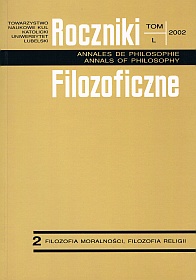Religious Experience as a Common Source of All Religions. Conception of Bernard Lonergan
Abstract
Bernard Lonergan SJ (1904-1984), the most famous English exponent of transcendental thomism („the American Rahner”), attached greater and greater importance, particularly after his existential turn, to religious experience. For him, the most significant form of this experience is being-in-love-with-God as basic, proper fulfillment of man's unrestricted thrust of self--transcendence in the direction of being, truth and value. It is experience of self-actualization, of complete integration, of complete fulfillment, it is a dynamic state of love in an unrestricted fashion, without qualifications or conditions or reservations or limits. This experience cannot be man's achievement, it is always granted to us as a gift, it is in principle independent of knowledge, we can only receive it, accept it when it comes quietly, secretly, unobtrusively. It is the core and focus of religious life, for Christians it is experience of God's grace; however the analysis of the main common features of religious experience in all highly developed religions demonstrates that, in point of fact, it is often a very similar experience, it is often the same experience. Religions have then a common origin, common essential realm. Of course, the understanding and interpreting of this experience depend always on the horizons of meaning in which it occurs and these horizons are as varied as the concrete, historically conditioned human cultures, human religious traditions, human temperaments, human lives are. Due to them, this one primordial experience manifests itself in countless ways, in countless religious expressions, but in spite of that it remains the real root and ground of the unity of all religions, it remains the basis for dialogue between them.
References
Crowe F. E.: Son of God, Holy Spirit, and World Religions, [w:] Appropriating the Lonergan's Idea, ed. M. Vertin, Washington: The Catholic University of American Press 1989, s. 324-343.
Herbut J.: Metoda transcendentalna: obiektywność poznania i jej kryterium. Omówienie koncepcji B. J. F. Lonergana, „Roczniki Filozoficzne”, 28(1980), z.1, s.91-117.
Lonergan B.: A Post-Hegelian Philosophy of Religion, [w:] A Third Collection: Papers by Bernard Lonergan, S.J., ed. F. E. Crowe, London: Geoffrey Chapman 1985, s. 202-223.
Lonergan B.: A Second Collection by Bernard J. F. Lonergan, S.J., ed. W. F. J. Ryan, B. J. Tyrrell, Philadelphia: The Westminster Press 1974.
Lonergan B.: A Third Collection: Papers by Bernard Lonergan, S.J., ed. F. E. Crowe, London 1985.
Lonergan B.: First Lecture: Religious Knowledge, [w:] A Third Collection [...], s. 115-128.
Lonergan B.: Insight: A Study of Human Understanding, Toronto: University of Toronto Press 19925.
Lonergan B.: Metoda w teologii, tł. A. Bronk, Warszawa: Instytut Wydawniczy Pax 1976 (przekład z ang. Method in Theology, London: Darton, Longman and Todd 1972).
Lonergan B.: Natural Knowledge of God, [w:] A Second Collection [...], s. 117-133.
Lonergan B.: Philosophy of God, and Theology, Philadelphia: The Westminster Press 1973.
Lonergan B.: Religious Commitment, [w:] The Pilgrim People: A Vision with Hope, ed. J. Papin, Villanova: Villanova University Press 1970, s. 45-69.
Mueller P. J.: Lonergan's Theory of Religious Experience, „Église et théologie” 7(1976)235-251.
Oko D.: Łaska i wolność. Łaska w Biblii, nauczaniu Kościoła i teologii współczesnej, Kraków: WAM 19982.
Oko D.: Struktura ducha ludzkiego według Bernarda Lonergana, „Analecta Cracoviensia”, 29(1997) 283-297.
Oko D.: Struktura poznania według Bernarda Lonergana, „Logos i Ethos”, 1998, nr 1 (6), s. 29-45.
Copyright (c) 2002 Roczniki Filozoficzne

This work is licensed under a Creative Commons Attribution-NonCommercial-NoDerivatives 4.0 International License.





